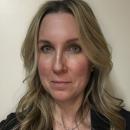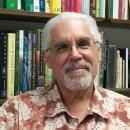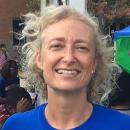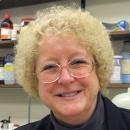
Bachelor’s Degree, Indiana University
Ph.D., University of Illinois, College of Medicine
Rumschlag-Booms, E. and Rong, L. Influenza A Virus Entry: Implications in Virulence and Future Therapeutics. Advances in Virology. January 2013.
Ahmet Dirim Arslan, Xiaolong He, Minxiu Wang, Emily Rumschlag-Booms, Lijun Rong, and William T. Beck. A High-Throughput Assay to Identify Small-Molecule Modulators of Alternative Pre-mRNA Splicing. J Biomol Screen 18(2):180-90 (2013).
Rumschlag-Booms E, Hongjie Zhang, D Doel Soejarto, Harry H S Fong, Lijun Rong. One-stone-two-birds, an antiviral screening protocol. J Antiviral Antiretroviral (2011), PMID 22140608.
Rumschlag-Booms E, Guo Y, Wang J, Caffrey M, Rong L., 2009. Comparative analysis between a low pathogenic and a high pathogenic influenza H5 hemagglutinin in cell entry. Virology Journal 2009, 6:76; June 10.
Guo Y, Rumschlag-Booms E*, Wang J, Xiao H, Yu J, Wang J, Guo L, Gao GF, Cao Y, Caffrey M, Rong L., 2009. Analysis of hemagglutinin-mediated entry tropism of H5N1 avian influenza. Virology Journal, 6:39; April 2. *Co-first author
Manicassamy B, Wang J, Rumschlag E, Tymen S, Volchkova V, Volchkov V, Rong L, 2007. Characterization of Marburg virus glycoprotein in viral entry. Virology, 358:79-88.
Room BBH 352D
Northeastern Illinois University
5500 North St. Louis Avenue
Chicago, IL 60625
United States

Keywords: Oxidative stress, hyperglycemia, curcumin, milk sIgA
Ph.D. in Biochemistry from Maharaja Sayajirao University of Baroda
M.S., in Biochemistry from Pune University
B.S. in Chemistry from Pune University
Faculty advisor: Beta Beta Beta National Biological Society
Room BBH 340E
Northeastern Illinois University
5500 North St Louis Avenue
Chicago, IL 60625
United States
Ph.D. in Molecular, Cellular and Developmental Biology from Indiana University
B.S. in Biology and M.S. in Zoology from Arizona State University
Kimble, M. and A. Schirmer. (2012) General Genetics: Laboratory Manual. Kendall/Hunt Publishing Co. Dubuque, Iowa
Northeastern Illinois University
5500 North St. Louis Avenue
Chicago, IL 60625
United States

Keywords: Plant ecology, ecology of woody plants, invasion ecology, population ecology
Ph.D. in Ecology from the University of Michigan
M.S. in Botany (Field Naturalist Program) from the University of Vermont
B.S. in Biology from the College of William & Mary
Room BBH 340F
Northeastern Illinois University
5500 North St. Louis Avenue
Chicago, IL 60625
United States

Keywords: invasive plant species, community ecology, habitat restoration
Ph.D., Ecology, University of Chicago
Post-doc., Ecology, Loyola University Chicago
M.S., Biology, Florida International University
B.S., Biology, Florida International University
A.A., Biology, Miami-Dade Community College
Undergraduate students are underlined
Geddes, P., L. Murphy, Y. Astudillo-Scalia, D. Blasini, S. Nugent, M. J. Rios, A. Schirmer, and J. P. Olfelt. 2021. Microsatellite markers reveal unprecedented high frequencies of hybridization among Typha species in the Midwestern US. Wetlands 41(2021): 1-9.
Pini, A.K. and P. Geddes. 2020. Fungi are capable of mycoremediation of river water contaminated with E. coli. Water, Air, and Soil Pollution 231:83.
Geddes, P. 2019. The invasion of the cattails. Podcast. In Defense of Plants. http://www.indefenseofplants.com/podcast/2019/4/21/ep-209-invasion-of-the-cattails
Volesky, L.A., S. Iqbal, J.J. Kelly, and P. Geddes. 2018. Relationships of native and exotic Phragmites australis to wetland ecosystem properties. Wetlands 38(3):577-589.
Room BBH 340H
Northeastern Illinois University
5500 North St. Louis Avenue
Chicago, IL 60625
United States
Majors, Minors, Graduate Programs & Certificates
Majors, Minors, Graduate Programs & Certificates
Biology Undergraduate and Graduate Programs
See our Fall 2024 newsletter for recent profiles of students and staff!
Are you interested in learning about the world around you? The Biology Department at Northeastern Illinois University can give you the tools to ask and answer those pressing questions that interest you. Biology is the study of living organisms (bacteria, protozoans, fungi, algae, plants and animals); our students have the opportunity to learn about these organisms at the molecular, cellular, organismal and ecological levels.
The Biology Department has accredited programs for the Biology major (B.S. Biology), the Biology minor, and the Biology graduate degree (M.S. Biology).
Follow us on Instagram @NEIUbiology, Facebook, and LinkedIn. Check out this fun TikTok video of Biology students and faculty doing summer research!
Why choose the Biology Department at Northeastern?
- You will engage directly with faculty in a small classroom or laboratory setting.
- You will practice relevant laboratory techniques, through our intensive laboratory-based curriculum.
- You can use those lab skills, gained in the classroom, to take on a research project with our faculty in a wide range of specializations.
- You can customize your education to meet your career objectives through our flexible curriculum.
Whether you’re interested in a career in biotechnology, health sciences, ecology, botany or zoology, the Biology Department at Northeastern Illinois University can give you the tools to succeed. Our graduates gain employment in industry, government and nonprofit organizations and successfully enter into medical, veterinary, pharmacy and other health professional programs and into master's degree and Ph.D. graduate programs.
statement of solidarity
The Biology Department values the different lived experiences of our students, faculty and staff. Diversity of thoughts, opinions and backgrounds enhances learning, teaching and discovery in the classroom, laboratory and community. We work to create a sense of inclusivity through collaborative learning environments that allow students to work together to collect, analyze and interpret data, as well as promote student interactions and discussions centered around those data.
As biologists, we recognize our responsibility as stewards of the natural environment, caretakers of human health, and innovators in the ethical development and equitable distribution of resources and knowledge. We empower students to relate the biological topics they are learning to pressing societal issues such as health care inequities and the impacts of climate change. By incorporating modern, cutting-edge technologies and research advances into our laboratory classes, we equip students with the tools they need to achieve excellence in their careers. See our Fall 2024, Fall 2023, Spring 2022, and Fall 2022 newsletters to learn some of what our students and faculty are doing!








